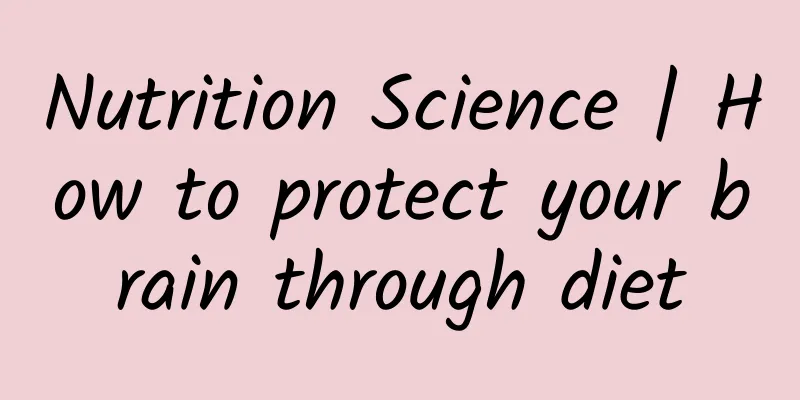Nutrition Science | How to protect your brain through diet

|
The brain is one of the most important organs in the human body and is the nerve center of the human body. It is responsible for our memory, emotions, language, learning, movement and other physiological and psychological functions. Various nutrients play an important role in the structure and function of the central nervous system, such as participating in the formation of nerve cells or myelin sheaths, neurotransmitter synthesis, the generation of new synapses or the synthesis of new proteins that are closely related to cognitive processes. So how can we protect the brain through a scientific diet? 1. What nutrients does the brain need? 1. Carbohydrates (glucose) The brain accounts for about 3-4% of the body mass, but consumes about 20-30% of the body's energy consumption. Carbohydrate-containing foods can provide sufficient glucose to maintain normal blood sugar levels, thereby providing sufficient energy for the brain to keep it functioning normally. 2. Fat Fat accounts for 60% of the brain mass and is the material basis for the formation of nerve cell membranes and myelin sheaths. Among them, unsaturated fatty acids, especially ω-3 fatty acids, such as DHA (docosahexaenoic acid), ALA (α-linolenic acid) and EPA (eicosapentaenoic acid), play an important role in the development and function of the brain. ω-3 fatty acids are also crucial for improving children's attention and learning efficiency. In addition, the brain phospholipid group (including cephalin, phosphatidylinositol, phosphatidylserine, sphingomyelin, lecithin), as a basic component of brain structure and one of the essential substances for neuron growth, plays an important role in promoting brain development and enhancing intelligence. 3. Antioxidant nutrients (vitamin C, vitamin E, lycopene, etc.) Neuronal cells have high levels of polyunsaturated fatty acids and are susceptible to oxidative damage, with the characteristics of high oxygen consumption and weak oxidative defense. Antioxidant nutrients (vitamin C, vitamin E, lycopene, etc.) can play an antioxidant role, protect brain cells from damage by free radical oxidative stress, and protect neural tissue. 4. B vitamins B vitamins are effective in improving mood and mental performance and enhancing stress tolerance. Together, this group of vitamins affects memory function and protects against age-related cognitive impairment. They play an important role in the synthesis of hormones related to mood regulation, help maintain a positive attitude, increase energy and improve attention, and also participate in gene expression as a cofactor of enzymes. Vitamin B1 (thiamine) helps brain cells use glucose. Vitamin B2 (riboflavin) can reduce oxidative stress caused by free radicals and repair mitochondrial dysfunction. Vitamin B6 promotes the growth and development of brain cells, enhances memory and thinking ability, and helps improve sleep quality. Vitamin B12 is an essential component for the synthesis of sphingomyelin, which is the main component of the protective myelin sheath of nerve fibers. It can increase the speed of nerve conduction, promote the growth and repair of nerve cells, and maintain the normal function of nerves. Folic acid is involved in DNA methylation and the synthesis and regulation of neurotransmitters. Pantothenic acid can nourish nerves and enhance brain function. 5. Choline Choline is a component of lecithin and a precursor of acetylcholine. It is an essential nutrient for promoting brain development, improving memory, nerve conduction, promoting fat metabolism, and biological membrane formation. Many scientific studies have pointed out that the content of acetylcholine in the brain is closely related to brain function and memory. Long-term lack of choline can cause a decline in learning ability and memory. 6. Carotenoids The brains of healthy elderly people are rich in carotenoids, most of which are lutein. Lutein and other carotenoids can reduce oxidative stress and inflammation levels, and can also reduce the risk of Alzheimer's disease (AD). Lutein can not only pass through the blood-brain barrier, but also has a special effect on maintaining brain function; people with a high intake of carotene in their diet or high levels of carotene in their blood have slower cognitive decline, fewer white matter lesions in the brain, less brain atrophy, and a lower risk of AD. 2. Which foods can enhance brain function? Reasonable dietary patterns and eating habits have an important relationship to brain health. While enjoying delicious food, we must learn to focus on scientific food combinations to nourish our brains, thereby enhancing brain function and maintaining brain health. 1. Fish Fish is a well-deserved brain food, mainly because fish is the main dietary source of omega-3 essential fatty acids. Common fish with high DHA content include tuna, rainbow trout, sardines, hairtail, yellow croaker, carp, hairtail, pomfret, crucian carp, eel, saury, etc. In addition, it is a high-quality source of protein required for the formation of mood-boosting neurotransmitters such as serotonin and dopamine, and is also an important source of vitamin B12. 2. Eggs Eggs contain protein, vitamin B12, choline and other ingredients. Whole eggs are a very rich source of choline. As a precursor of acetylcholine, choline plays an important role in memory and learning. Sufficient acetylcholine is essential for improving memory and the agile and focused thinking required as we age. 3. Berries Various berries, such as blueberries, strawberries, raspberries and blackberries, are rich in vitamin C, vitamin E, and flavonoids, which act as potent antioxidants that protect brain cells from oxidative damage. Studies have shown that flavonoids can improve many cognitive functions, including memory, learning and decision-making, and can also prevent age-related neurasthenia and prevent Alzheimer's disease. 4. Dark vegetables In order to protect cognitive ability and reduce the risk of AD, we should pay attention to eating more dark fruits and vegetables. Kale, dandelion leaves, mustard greens, fresh parsley, spinach, lettuce, etc. are all natural foods with high lutein content. Kale is rich in antioxidants, including beta-carotene, flavonoids and polyphenols. It is also a good source of vitamin C and B vitamins, especially folic acid, and is one of the high-quality foods for maintaining brain health. It is worth mentioning that pumpkin and other fruits are rich in carotene and vitamin E, which have the effects of protecting eyesight, anti-aging, and enhancing memory. 5. Nuts Walnuts are one of the best food sources of ALA (alpha-linolenic acid). Studies have found that eating walnuts can improve reaction time and is beneficial to learning and memory. Sunflower seeds are rich in iron, zinc, potassium, magnesium, and vitamin E, which can keep the brain sharp, enhance memory, and prevent anemia. Peanuts are rich in lecithin and cephalin, which are important substances needed by the nervous system. They can delay the decline of brain function and help prevent the formation of cerebral thrombosis. 6. Sea vegetables Marine vegetables are rich in mineral elements such as iodine, and some are also a good source of vitamin B12, which is essential for brain and nerve health. For example, seaweed is rich in vitamin B12. In addition, marine vegetables are also a good source of tyrosine, which is a precursor amino acid of dopamine in the brain and plays an important role in maintaining brain function. 7. Dark Chocolate Chocolate is a great source of tryptophan, a precursor amino acid for serotonin (5-HT), which promotes brain plasticity and helps prolong the life of brain cells. The flavonoids in chocolate can stimulate blood flow to the brain, helping improve memory, concentration, and problem-solving skills. 3. The brain dislikes these 3 types of food the most 1. Red meat and processed meat products Studies have found that eating too much red meat and processed red meat will increase the body's inflammatory response, which is not good for brain health. It is recommended that you should not eat more than 300 grams of red meat per week, eat more fresh meat, and eat less or no processed red meat. 2. Cakes or candies This kind of pastry, like biscuits or cakes, contains a lot of trans fatty acids. Trans fatty acids can increase cardiovascular and cerebrovascular diseases and increase the body's inflammation levels, which is not good for the brain, so it is recommended that you do not eat it more than once a week. 3. Fried foods Fried foods are not only high in fat, but also contain a lot of substances that are harmful to the human body and can significantly reduce a person's cognitive function level. Brain health is an important part of our overall health, and diet is one of the key factors in maintaining brain health. Through reasonable dietary patterns and eating habits, we can effectively improve brain function, improve memory, and delay brain aging. Of course, in addition to diet, maintaining good living habits, proper exercise and adequate sleep are also indispensable factors in maintaining brain health. Only by taking multiple factors into consideration can we truly achieve brain health and agile thinking. |
<<: [Medical Q&A] What are the ways to supplement calcium during pregnancy preparation?
>>: [Medical Q&A] Which exercises are considered aerobic exercises?
Recommend
What is the difference between matcha and green tea? Can matcha refresh you?
Matcha green tea is an ideal substitute for coffe...
Backache, abdominal distension, delayed menstruation
Symptoms such as lower back pain, abdominal diste...
Can uterine serosa fibroids cause uterine bleeding?
Nowadays, more and more women do not know much ab...
What's the matter with women's long body hair?
When the hot summer comes, people start to wear l...
Can pregnant women eat bananas?
For pregnant women who have elderly people at hom...
Hyperuricemia/gout diagnosis and treatment pathway
1. Diagnosis of Hyperuricemia: 1: Fasting blood u...
Children always cough and cough, beware of whooping cough
What is whooping cough, as mothers ask? Doctors f...
Can I eat turtle eggs during my period?
Turtle eggs are not a food that we often eat in o...
What is the method to solve dysmenorrhea in ten minutes?
Women often suffer from dysmenorrhea, and there a...
Can I wear makeup during pregnancy?
Many female friends like to wear makeup. After al...
Is the redness of the uterus an inflammation?
During the examination, if the cervix becomes red...
What should I do if I have sex 20 days after having an abortion?
Abortion means artificial abortion. Many people c...
What tests should be done at 28 weeks of pregnancy
What kind of examinations should be done at 28 we...
A lump on your cervix? Let’s take a look at these impacts
A lump in the cervix is a common disease among ...









